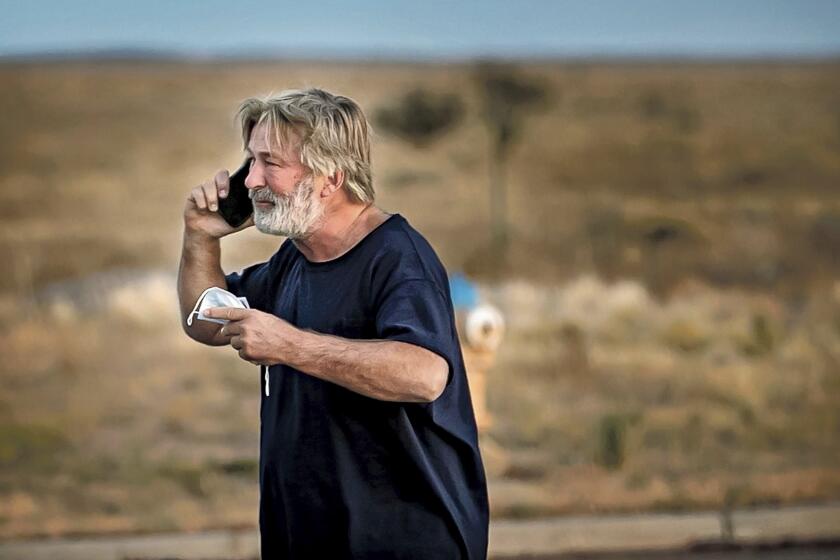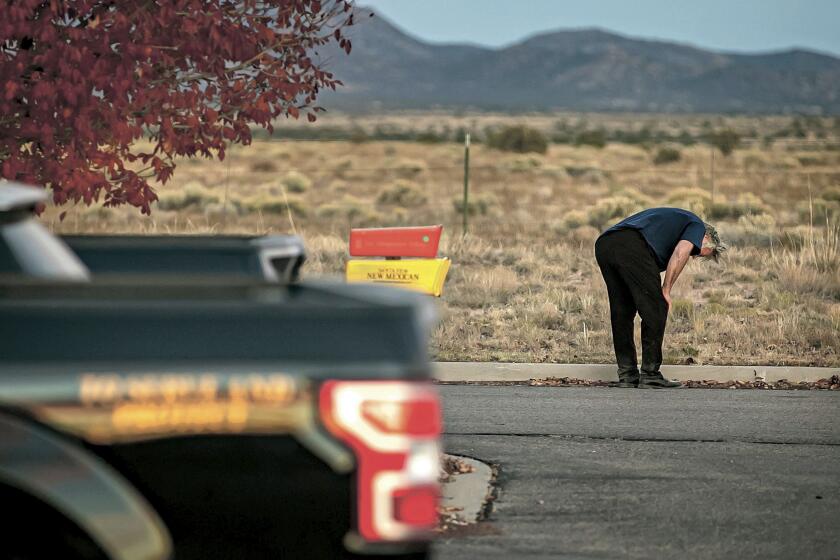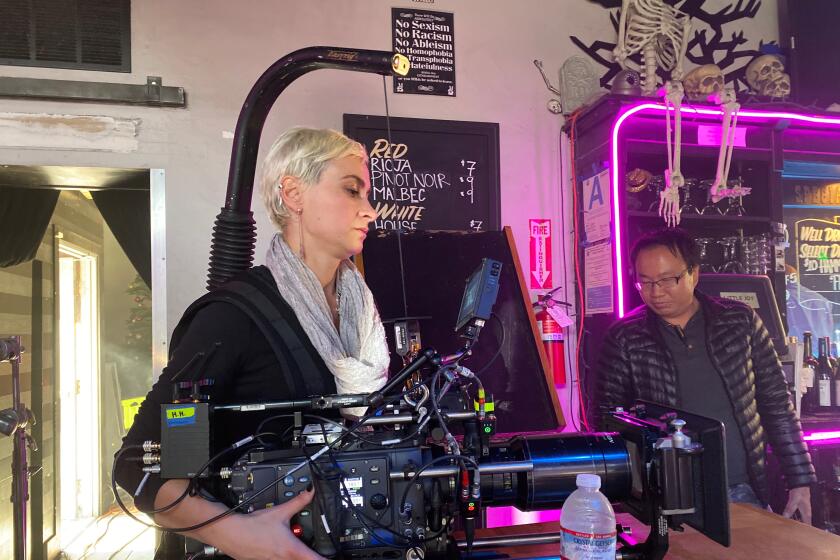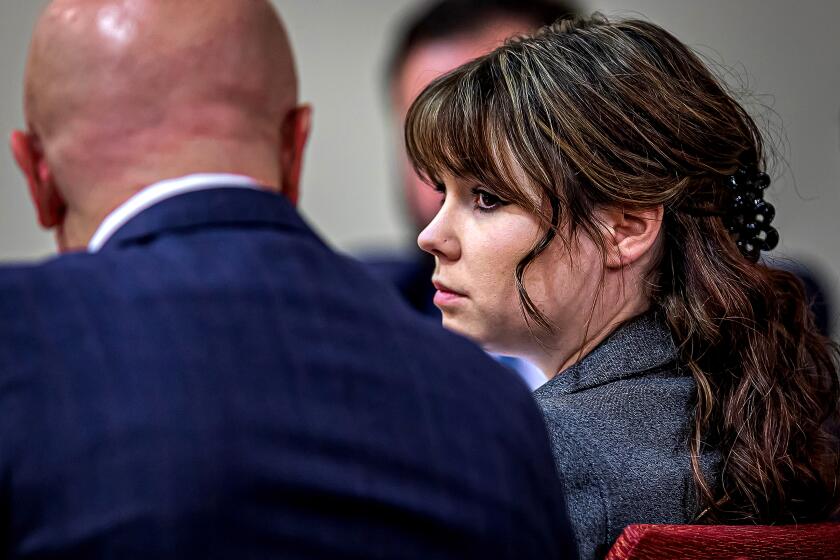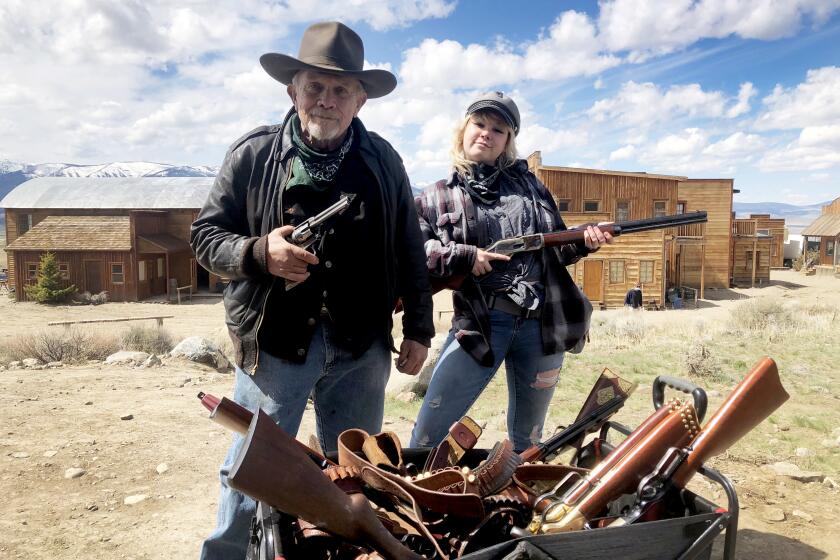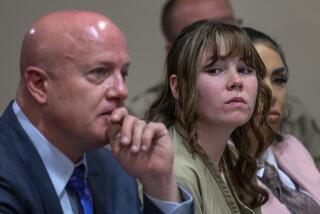‘Rust’ director Joel Souza describes being injured in Alec Baldwin shooting: ‘Nothing made sense’
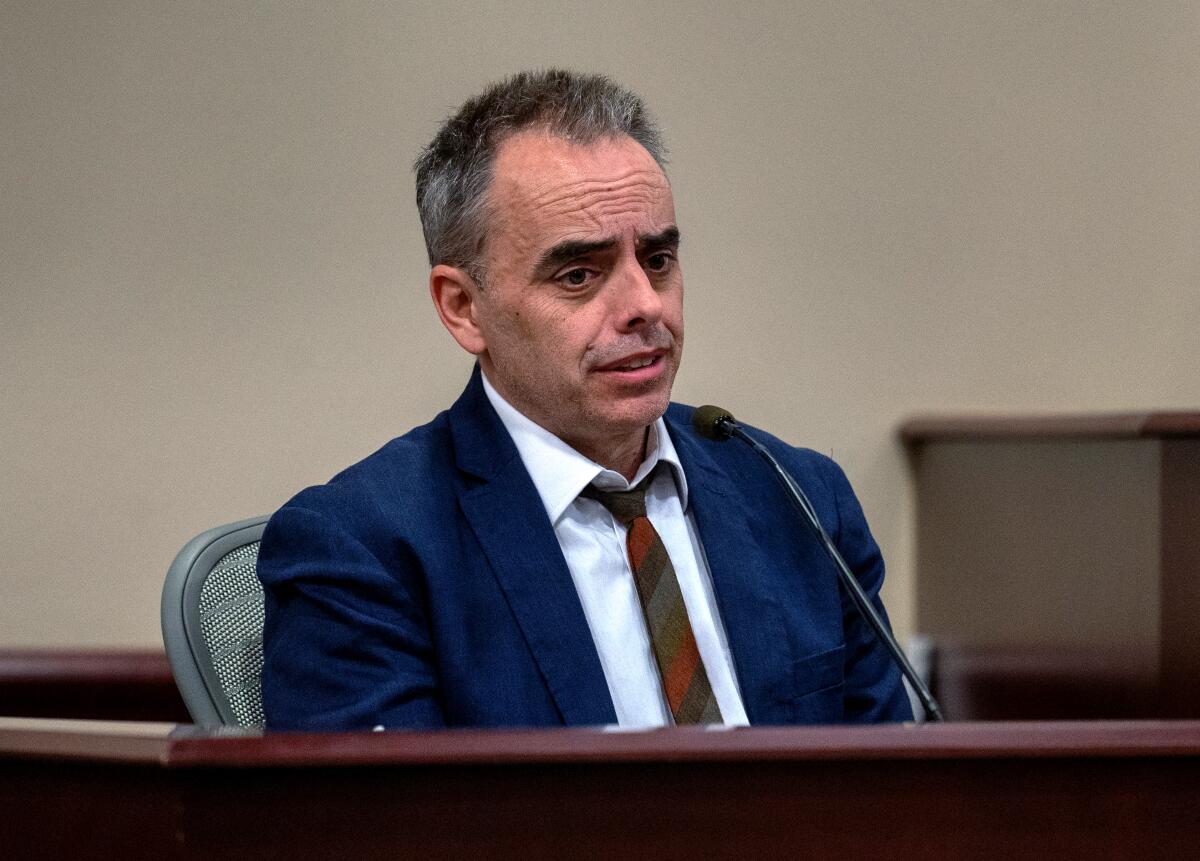
“Rust” director Joel Souza, who was injured when Alec Baldwin fired a prop gun, said he couldn’t wrap his head around what had transpired on the New Mexico film set — even after being rushed to a hospital.
“I knew something got me,” Souza testified Friday in a Santa Fe, N.M. courtroom on the seventh day of testimony in the involuntary manslaughter trial of Hannah Gutierrez. The 26-year-old Arizona woman could spend up to three years in prison if convicted of felony charges filed against her related to the on-set death of Halyna Hutchins on Oct. 21, 2021.
Friday marked the first time Souza has publicly described details of the tragic accident that claimed the life of up-and-coming cinematographer Hutchins. She had impressive credentials and had sought the job on “Rust” because she wanted to work on a western.
In disbelief that afternoon, Souza recalled arguing with medical personnel at the Santa Fe hospital where he was taken by ambulance. He said he insisted that his injury could not have been caused by an actual bullet.
Hollywood safety protocols forbid having actual ammunition on a movie set.
“I just kept saying: ‘You don’t understand,’” Souza testified before the 12-member jury and four alternate jurors. “This was a movie and that’s not possible. And they kept saying: ‘No, no, no. It is [an actual bullet].’ They eventually grew tired of my protesting because they showed me the X-ray of my back and there was a very large bullet in it.”
At least one of the camera operators complained last weekend to production managers about gun safety on the set.
Moments before the shooting, Souza entered the wooden church on the movie set at Bonanza Creek Ranch and moved in behind Hutchins, who had been discussing Baldwin’s next scene. The actor was sitting in a pew, in full costume, facing the door. Souza testified that he didn’t know who had brought the gun in the church or who handed it to Baldwin.
“I went in to look to see what was going on with the camera angle,” Souza said. “What I wanted to do was get behind Halyna to try to sneak a look over her ... to see what [the camera view] was looking like, but I never even got to look at that.”
That’s when the gun went off.
“There was an incredibly loud bang,” Souza said. “This was deafening. It felt like somebody had taken a baseball bat to my shoulder. I remember that distinctly, and sort of stumbling back and shouting. I don’t remember exactly what I said.”
Souza testified that he watched crew members help lower Hutchins to the ground. “Nothing made sense. I remember initially thinking that [perhaps] she’d been startled by it. ... Then I saw the blood on her back.”
Interviews with multiple members of the “Rust” crew paint an hour- by-hour picture of a cascade of bad decisions that created a chaotic set on which a lead bullet was put into a prop gun.
Baldwin — who was indicted in January by a grand jury on involuntary manslaughter charges — has said he didn’t pull the trigger, but that the gun went off during the rehearsal. Baldwin has pleaded not guilty. If convicted, he would face as much as 18 months in prison.
The bullet entered Hutchins on the right side of her chest, passed through her and lodged in Souza’s shoulder. The 42-year-old mother died later that afternoon after being airlifted to an Albuquerque trauma hospital.
Souza described interviewing about eight cinematographers for the job on “Rust.” He said he was impressed by Hutchins’ backstory — she was born in Ukraine and grew up on a naval base in the Arctic Circle — and her film credentials, including her American Film Institute education.
“As a woman cinematographer, I think that’s doubly impressive,” Souza said. “Because if you look at the numbers [of women cinematographers] in our business, they’re sort of atrocious in that regard. ... She was very keen to do a western.”
They bonded over Zoom calls during the pandemic, he said.
“There was something about Halyna,” Souza said. “We were really in tune with what we both thought the movie should be.”
After deciding on Hutchins, Souza said he told the film’s producers and production managers to hire her: “Please don’t botch the deal because she’s really great.”
Halyna Hutchins, the cinematographer killed on set of an Alec Baldwin movie, was going to be ‘very famous,’ a director who worked with her said.
Gutierrez’s trial, which is expected to last through next week, is being broadcast by Court TV.
Souza testified that he didn’t have much experience with guns and ammunition, and “Rust” was only the second film that he worked on to have guns and require an armorer. He said he wasn’t responsible for hiring Gutierrez, who was working on only her second movie as head armorer.
Trial testimony has touched on whether Gutierrez was sufficiently qualified; special prosecutors have said witnesses described her work as “sloppy” and “unprofessional.”
But the director, who also wrote the screenplay for “Rust,” said the third day of production was a complex day of filming, with scenes that called for gun shootouts and a western town bustling with horses, a donkey and extras brought in to portray town folk. After that day unfolded successfully, Souza acknowledged that he sent a message to Gutierrez complimenting her on her work that day.
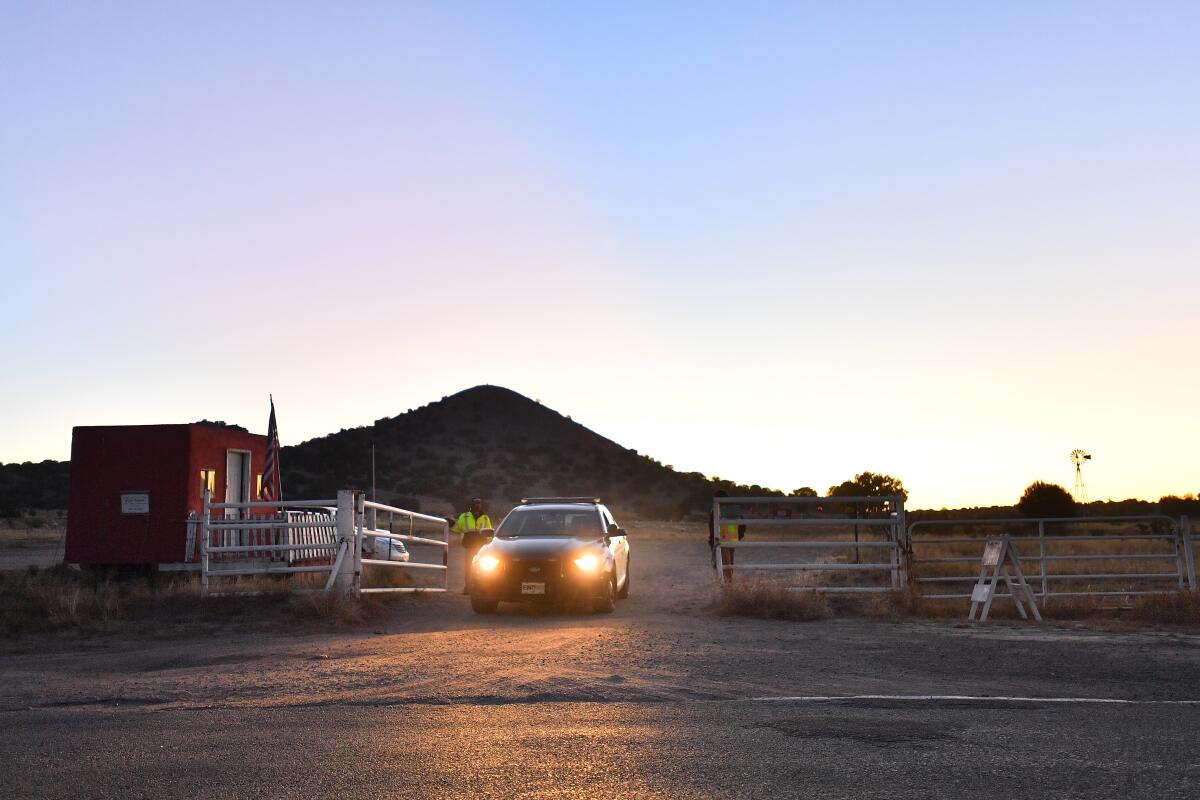
Souza said he wasn’t sure of Gutierrez’s actions on the day of the shooting. But he had a distinct memory of seeing the young armorer in the church doorway when he was on the ground after being shot.
“She looked distraught. I remember her saying, ‘I’m sorry. I’m sorry, Joel,’” Souza testified. “And I remember somebody just screaming at her and they just ushered her out.”
Souza testified that Baldwin had initially hired him to write the screenplay for “Rust,” and the two men were eager to collaborate on a western film. New Mexico was selected because of its generous tax incentives and the picturesque high-desert vistas, which conjure up the Old West.
Prosecutors opened the first trial in the “Rust” shooting death by focusing on cinematographer Halyna Hutchins, who was killed. Armorer Hannah Gutierrez faces charges of involuntary manslaughter and tampering with evidence.
During Friday afternoon’s session in the trial, drama heightened during testimony by on-set medic Cherlyn Schaefer — who struggled to treat Hutchins’ extensive wounds as the cinematographer lay dying on the wooden planks on the church floor. Schaefer has sued Baldwin and other crew members, saying she has suffered trauma because she did not have other sufficiently trained medical personnel, or equipment, available to help while they waited for Santa Fe County paramedics to arrive.
A defense attorney suggested that she appeared at the trial to boost her case for monetary damages. Schaefer bristled, saying her legal efforts began as a way to bring a greater focus on safety to New Mexico’s film community.
In the email exchange, armorer Hannah Gutierrez Reed said she couldn’t simultaneously focus on two roles: “That’s when mistakes get made.”
Schaefer said she wanted to explain further, and New Mexico 1st Judicial District Court Judge Mary Marlowe Sommer agreed.
“I went home that night and I looked at my little boy who is the same age as Halyna’s son,” Schaefer said. “And all I could think about is how I could not save his mother’s life and how he was going to grow up without a mother. And how her spouse lost the love of his life ...”
Sommer abruptly stopped Schaefer in mid-sentence.
“I mean no harm to you,” the judge told Schaefer. “But we’re going to strike that testimony.”
Sommer told the jury to disregard Schaefer’s personal narrative.
More to Read
Inside the business of entertainment
The Wide Shot brings you news, analysis and insights on everything from streaming wars to production — and what it all means for the future.
You may occasionally receive promotional content from the Los Angeles Times.
